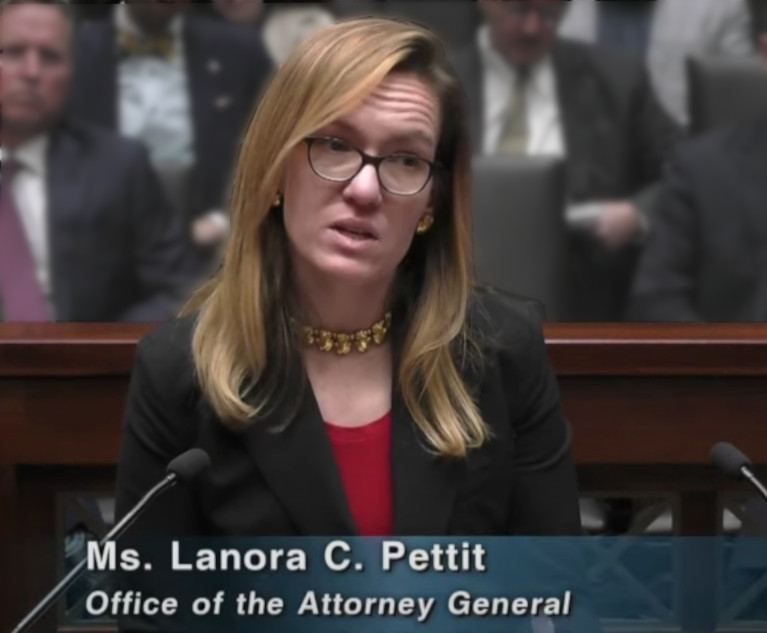Lawyer Settles With Judge Accused of Cutting His Caseload for Criticizing Indigent Defense Appointments
"What I'm concerned with is upholding the law and constitutional rights of my clients, who are primarily indigent defendants,” said plaintiff Drew Willey.
April 24, 2019 at 05:37 PM
4 minute read
 Houston solo practitioner Drew Willey. Courtesy photo.
Houston solo practitioner Drew Willey. Courtesy photo.
A criminal-defense lawyer who alleged that a Galveston County judge cut his assigned cases in retaliation for criticizing the county's indigent defense practices has settled his lawsuit with the judge.
Galveston County Court-at-Law No. 3 Judge Jack Ewing did not admit to any wrongdoing in the April 22 settlement agreement with Houston solo practitioner Drew Willey. They both agreed they share a goal of providing high-quality indigent defense and following the law and U.S. Constitution. Willey and Ewing also said they would abide by the Texas Fair Defense Act and their county's indigent defense plan.
“There was no evidence of any wrongdoing as alleged by Mr. Willey. Judge Ewing has merely agreed to continue to follow the rule of law as Judge Ewing has and will continue to do,” said Mike Lowenberg of the Lowenberg Law Firm in Houston, who represented Ewing. “Hopefully, this settlement will help prevent, or at least discourage in the future, frivolous claims against members of our judiciary, unless those claims have serious merits.”
Willey said he hopes to see future improvements in how the county handles its jail docket, and the potential establishment of a public defender office.
“I've got to hand it to Judge Ewing. He started appointing me to these cases again and the settlement, I think, on his willingness to follow the plan and the law speaks for itself. That is primarily what I'm concerned with is upholding the law and constitutional rights of my clients, who are primarily indigent defendants,” Willey said.
Earlier in the case, a magistrate judge recommended dismissing Willey's claims for attorney fees and injunctive relief, but refused to grant Ewing's arguments to dismiss claims for declaratory relief. The Dec. 17, 2018, memorandum and recommendation explained that Willey alleged that Ewing removed him from cases and stopped assigning him new cases because Willey spoke out about court practices, appealed the denial of his full attorney fees in cases, and filed complaints with state agencies. For example, Willey said appointed lawyers have inadequate resources to represent clients, the county has an unconstitutional money bail system and that defense lawyers can't talk confidentially with their clients.
Ewing claimed the court should dismiss the case because Willey didn't actually suffer any injury. He argued the attorney was only speculating about the reason for his lack of appointments. Willey had only guessed the random selection of attorneys was unlikely to be the reason for the size of his caseload, and had assumed it resulted from retaliation by the judge, according to Ewing.
But the magistrate judge disagreed, and found Willey's complaint did allege concrete harm. Ewing had also claimed there was no connection between what he allegedly did, and any harm to Willey. But the court determined that Willey's complaint had crossed a threshold by alleging an injury that fairly could be traced to Ewing's actions.
Ewing argued that case law from the U.S. Court of Appeals for the Fifth Circuit would bar Willey from collecting attorney fees or winning injunctive relief in the case. The court agreed, and dismissed those claims.
Among other things, Ewing argued the court should dismiss the case because Willey didn't allege enough facts to support a First Amendment retaliation claim. The court disagreed, saying that Willey's pleading sufficiently alleged an adverse employment action: losing his assigned cases and future appointments in Ewing's court. His speech, detailed in the complaint, did involve a matter of public concern. Willey filed a complaint with the Texas Indigent Defense Commission in May 2016, and Ewing removed him from a case 11 days later, which is sufficient to allege that his speech motivated Ewing's action.
This content has been archived. It is available through our partners, LexisNexis® and Bloomberg Law.
To view this content, please continue to their sites.
Not a Lexis Subscriber?
Subscribe Now
Not a Bloomberg Law Subscriber?
Subscribe Now
NOT FOR REPRINT
© 2025 ALM Global, LLC, All Rights Reserved. Request academic re-use from www.copyright.com. All other uses, submit a request to [email protected]. For more information visit Asset & Logo Licensing.
You Might Like
View All


Trending Stories
Who Got The Work
J. Brugh Lower of Gibbons has entered an appearance for industrial equipment supplier Devco Corporation in a pending trademark infringement lawsuit. The suit, accusing the defendant of selling knock-off Graco products, was filed Dec. 18 in New Jersey District Court by Rivkin Radler on behalf of Graco Inc. and Graco Minnesota. The case, assigned to U.S. District Judge Zahid N. Quraishi, is 3:24-cv-11294, Graco Inc. et al v. Devco Corporation.
Who Got The Work
Rebecca Maller-Stein and Kent A. Yalowitz of Arnold & Porter Kaye Scholer have entered their appearances for Hanaco Venture Capital and its executives, Lior Prosor and David Frankel, in a pending securities lawsuit. The action, filed on Dec. 24 in New York Southern District Court by Zell, Aron & Co. on behalf of Goldeneye Advisors, accuses the defendants of negligently and fraudulently managing the plaintiff's $1 million investment. The case, assigned to U.S. District Judge Vernon S. Broderick, is 1:24-cv-09918, Goldeneye Advisors, LLC v. Hanaco Venture Capital, Ltd. et al.
Who Got The Work
Attorneys from A&O Shearman has stepped in as defense counsel for Toronto-Dominion Bank and other defendants in a pending securities class action. The suit, filed Dec. 11 in New York Southern District Court by Bleichmar Fonti & Auld, accuses the defendants of concealing the bank's 'pervasive' deficiencies in regards to its compliance with the Bank Secrecy Act and the quality of its anti-money laundering controls. The case, assigned to U.S. District Judge Arun Subramanian, is 1:24-cv-09445, Gonzalez v. The Toronto-Dominion Bank et al.
Who Got The Work
Crown Castle International, a Pennsylvania company providing shared communications infrastructure, has turned to Luke D. Wolf of Gordon Rees Scully Mansukhani to fend off a pending breach-of-contract lawsuit. The court action, filed Nov. 25 in Michigan Eastern District Court by Hooper Hathaway PC on behalf of The Town Residences LLC, accuses Crown Castle of failing to transfer approximately $30,000 in utility payments from T-Mobile in breach of a roof-top lease and assignment agreement. The case, assigned to U.S. District Judge Susan K. Declercq, is 2:24-cv-13131, The Town Residences LLC v. T-Mobile US, Inc. et al.
Who Got The Work
Wilfred P. Coronato and Daniel M. Schwartz of McCarter & English have stepped in as defense counsel to Electrolux Home Products Inc. in a pending product liability lawsuit. The court action, filed Nov. 26 in New York Eastern District Court by Poulos Lopiccolo PC and Nagel Rice LLP on behalf of David Stern, alleges that the defendant's refrigerators’ drawers and shelving repeatedly break and fall apart within months after purchase. The case, assigned to U.S. District Judge Joan M. Azrack, is 2:24-cv-08204, Stern v. Electrolux Home Products, Inc.
Featured Firms
Law Offices of Gary Martin Hays & Associates, P.C.
(470) 294-1674
Law Offices of Mark E. Salomone
(857) 444-6468
Smith & Hassler
(713) 739-1250







